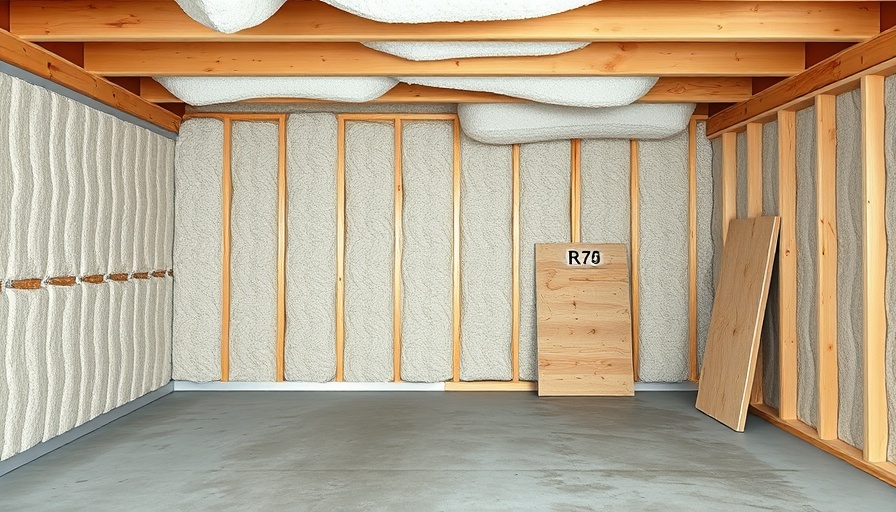
Enhancing Your Basement: A Guide to Effective Insulation
If you're a homeowner looking to increase your home's energy efficiency and comfort, especially during harsh weather, insulating your basement is one vital step you shouldn’t overlook. Based on practical tips presented in the video How to Insulate Your Basement (For a Lower Heat Bill), we’ll explore various methods to achieve optimal insulation, ensuring your home remains cozy in winter while staying cool in summer.
In How to Insulate Your Basement (For a Lower Heat Bill), the discussion dives into effective insulation strategies, exploring key insights that sparked deeper analysis on our end.
Understanding the Importance of Insulation
Insulation creates a thermal barrier that helps maintain the desired temperature in your home, significantly impacting energy bills. In areas like Canada, where winters are particularly harsh, proper insulation becomes crucial to retain heat and diminish heating costs. By insulating your basement effectively, you can improve energy efficiency, reduce bills, and enhance comfort, which is particularly valuable for homeowners and remodelers.
Types of Insulation: Choosing What's Right for Your Space
In the video, Jeff discusses a multi-faceted approach to basement insulation, highlighting three key materials: rigid foam, bat insulation, and spray foam. By combining these materials, you can maximize the R-value of your insulation, which measures its resistance to temperature change.
1. **Rigid Foam**: This material provides substantial thermal resistance and is ideal for sealing foundation walls. It acts as a vapor barrier, preventing moisture from penetrating your living space.
2. **Bat Insulation**: Often used for its cost-effectiveness, bat insulation fills gaps and helps regulate the temperature, ensuring a more balanced heating and cooling environment.
3. **Spray Foam**: This versatile option serves the dual purpose of insulation and sealing air leaks, providing an effective vapor lock. Its adaptation to various spaces makes it a favored option for tricky areas.
Key Steps to Insulate Your Basement
When embarking on an insulation project, it's vital to remember best practices to ensure effectiveness:
1. **Prepare the Surface**: Ensure your walls are clean and dry before applying any insulation. This step is essential for proper adhesion.
2. **Measure and Cut Properly**: Take accurate measurements for your foam and bat insulation, cutting them to fit snugly. This helps create a thermal break around your exterior foundation.
3. **Install with Care**: When setting up the foam board, apply adhesive properly to avoid moisture intrusion. It’s crucial to leave an airspace, as moisture management is key in insulation.
4. **Seal Any Gaps**: Utilize spray foam for any remaining gaps to create a continuous barrier and prevent drafts. Over time, these careful setups can significantly reduce future remediation efforts.
The Benefits of Proper Insulation
Investing in efficient insulation equates to far more than immediate comfort. Here are some long-term gains:
1. **Lower Energy Bills**: Proper insulation leads to reduced energy consumption, translating to lower heating and cooling costs, a compelling reason for homeowners and prospective buyers alike.
2. **Enhanced Home Value**: For home sellers, a well-insulated basement can elevate the property's market value, appealing to buyers interested in energy-efficient homes.
3. **Improved Indoor Air Quality**: Effective insulation helps manage indoor humidity levels, preventing mold and ensuring a healthier living environment.
Addressing Challenges in Basement Insulation
Not every home is created equal when considering insulation. Older homes may pose unique challenges that require special attention:
1. **Building Codes**: Always check local building codes to ensure compliance, especially when undertaking renovations or significant changes to existing insulation.
2. **Water Management**: In regions with heavy rainfall or high humidity, moisture control is essential. Consider using a sump pump or water diversion techniques alongside insulation to manage water flow.
Conclusion: Taking Action on Your Basement
In summary, proper basement insulation not only enhances your comfort but also offers substantial financial benefits. As recent trends in home improvement continue to shift toward energy efficiency, taking the necessary steps today to insulate your basement can significantly improve your overall living experience. Now is the perfect time to start your home improvement journey—contact a professional, access quality materials, and make the necessary renovations that can transform your living space. Your comfort, savings, and home value will appreciate your efforts.
 Add Row
Add Row  Add
Add 




 Add Row
Add Row  Add
Add 








Write A Comment